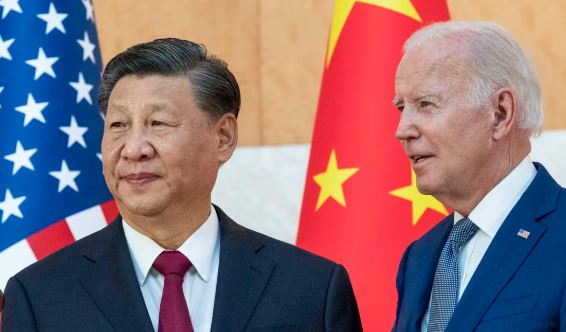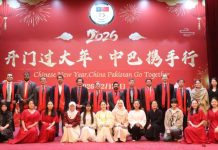By Zhong Sheng, People’s Daily
China-U.S. relations recently showed positive signs, including a series of important high-level exchanges and new stories of people-to-people friendship. This is welcomed by both the two countries and the international community.
The healthy and stable development of China-U.S. relations not only is in line with the interests of both countries and their peoples, but also meets the common expectations of the international community.
The two sides should adhere to the three principles of mutual respect, peaceful coexistence and win-win cooperation, earnestly return to what was agreed by the two heads of state in Bali, work to stabilize the China-U.S. relationship from further deterioration, and bring it back to the track of sound and stable development at an early date.
China-U.S. relationship is the most important bilateral relationship in the world. Whether the two countries can get along well determines the future of humanity. Fifty two years ago, leaders of the two countries, with remarkable strategic vision, made the right choice to seek cooperation between China and the United States, kicking off the process of normalization of bilateral relations. This has not only benefited the two countries, but also changed the world.
The achievements of China-U.S. relations have not come easily and should be cherished all the more. The world is currently undergoing momentous changes unseen in a century, and the international landscape is witnessing significant shifts. The world needs a stable China-U.S. relations more than ever.
As former U.S. Secretary of State Henry Kissinger said earlier, peace and progress between China and the United States is in the self-interest of each country and of the world.
China’s policytoward the United Statesis consistent, which is mutual respect, peaceful coexistence and win-win cooperation. China always believes that the two countries should be partners, not rivals, and they should pursue mutual benefit and win-win outcomes, not zero-sum games. It always hopes that China-U.S. relations would become stable and improve, rather than slide into conflict and confrontation.
China always holds that the two countries should break free of competitive and confrontational thinking, take care of each other’s interests and concerns, seek the greatest common ground for exchange and cooperation, and expand the convergence of interests in win-win cooperation.
Both history and reality have repeatedly proved that the two countries both stand to gain from cooperation and lose from confrontation, and thus cooperation is the best choice for them. China and the United States have joined hands in combating terrorism, addressing the international financial crisis, combating the Ebola virus, and leading the achievement of the Paris Agreement on climate change. Through cooperation, they have made significant contributions to the world.
Faced with the increasingly more global challenges today, it is even more crucial for both sides to choose the path of cooperation. Global economic recovery, tackling climate change, and resolving international and regional hotspot issues all require coordination and cooperation between China and the United States.
It is important to see that the world is big enough for the two countries to develop themselves and prosper together. China and the United States, as the world’s two largest economies, account for more than a third of the global economy and nearly a quarter of the world’s population, and bilateral trade accounts forabout a fifth of the global total. The interests of both sides are closely intertwined. It is important to recognize and prioritize the common interests that exist between the two nations, as their individual successes present opportunities rather than threats for each other.
The root cause of the difficulties facing China-U.S. relationship over recent years is that the U.S. perception and views of China are seriously distorted. Some people in the United States hold onto a Cold War mentality, using competition as an excuse to encircle, contain, and suppress China. Such actions will only push China and the U.S. towards confrontation and the world towards a new Cold War.
China and the United States are two huge countries with different histories, cultures, and social systems. It is inevitable for them to have differences and competition. However, this should not hinder both sides from engaging in cooperation based on common interests, nor should it be a reason for confrontation and hostility between them.
Competition should not be the keynote of China-U.S. relationship, and the development of this relationship should adhere to certain bottom lines. The one-China principle and the three joint communiques between China and the U.S. are the most important political foundation of the bilateral relationship and must be protected and upheld without interference.
The sound development of China-U.S. relations requires pooling the strength of all sides.The foundation of China-U.S. relations lies among the people, the hope is in the people, the future lies in the youth, and the vitality lies in sub-national areas.
The Kuliang story is a testament to the unwavering friendship between the Americans and Chinese. The U.S.-China Youth and Student Exchange Association in Washington State is dedicated to promoting mutual understanding between American and Chinese youth. The Stilwell family, spanning several generations, has been instrumental in fostering friendly cooperation between the United States and China. The spirit of the Flying Tigers has been passed down through generations, connecting the people of both countries. California has also actively expanded green cooperation with China. These vivid examples demonstrate the profound friendship between the Chinese and Americans and the immense potential for cooperation between the two nations.
China’s efforts to promote dialogue and exchanges at various levels with the U.S.demonstrate the country’s broad vision, long-term perspective, and sense of responsibility that comes with its major country diplomacy.
Amid the changing international landscape, China-U.S. relations are at a critical juncture. The two countries should shoulder their responsibilities to the people, history and the world, follow the principles of mutual respect, peaceful coexistence and win-win cooperation, and promote the stable and positive development of China-U.S. relations. It is hoped that the United Stateswill work with China in the same direction.
(Zhong Sheng is a pen name often used by People’s Daily to express its views on foreign policy and international affairs.)

















